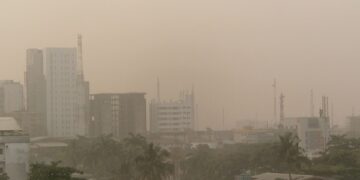The Environmental Protection Agency (EPA) has advised the public, especially children, pregnant women, older adults, and persons with pre-existing heart and lung diseases to wear nose mask to keep safe from the current dusty dry air (Particulate Matter 2.5).
The Agency has also cautioned susceptible persons to limit outdoor activities, noting that the pollution levels could trigger allergic reactions and worsen conditions, including asthma.
The main constituent of the dust is Particulate Matter (PM) 2.5 – fine (smaller) particles, which can penetrate deep into the respiratory and cardiovascular system, impair the normal function of organs, which is hazardous to health.

PMs are seen and unseen tiny pieces of solids or liquids in the air. The particles include dust, dirt, soot, and smoke.
A source said the Agency’s air quality monitoring stations at the University of Ghana and Adabraka showed increased levels of dust due to the onset of the harmattan season.

The observation, which began on 13th December, 2024, has an Air Quality Index between unhealthy for sensitive groups and very unhealthy from 13th December to date.
The EPA’s observation is in line with information from the Ghana Meteorological Agency’s daily forecast of significant dust in the air originating from the Sahel region resulting in poor visibility.
Predictions are that the weather conditions can be experienced until the latter part of December.
In Accra, analysis of data collected early December 2024 on the Breathe Accra Project websites showed high levels of pollution at all monitoring locations in the country.
Dr. Allison Felix Hughes, the Facility Manager of Afri-SET, a sensor evaluation center, who confirmed elevated levels of dust making the air unhealthy, appealed to the public not to spend much time outdoors as a first defense mechanism.
“If by any way you have to be out then try to protect yourself by either wearing a face mask or limiting the number of hours outdoors to reduce exposure. This is a natural phenomenon. We have no control over it,” he said.
“It is during this period that you see the hospital admissions growing with cases of asthma, bronchitis, and other respiratory diseases.”
He advised the public to stay safe by using pollution masks where necessary, desist from open burning of waste and other materials.
The public is also urged to sprinkle water on dusty surfaces before sweeping to reduce dust emissions.
Vehicle users are also to reduce speeding on untarred roads to reduce dust emissions.
“Vehicles and other fuel-burning installations/machines, including generator sets should be serviced regularly to optimise their functioning, idling of their engines should be avoided,” he urged.
GNA

































